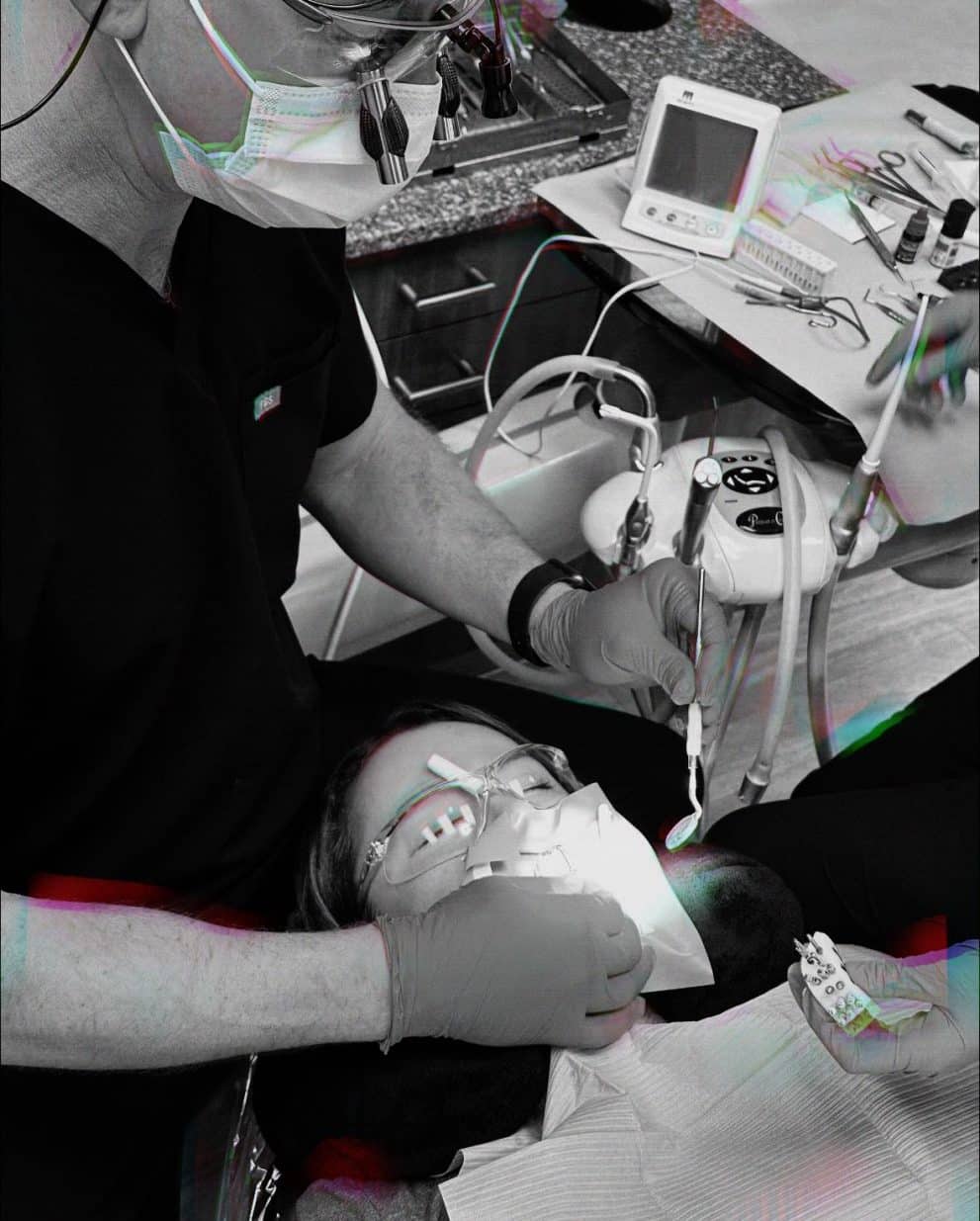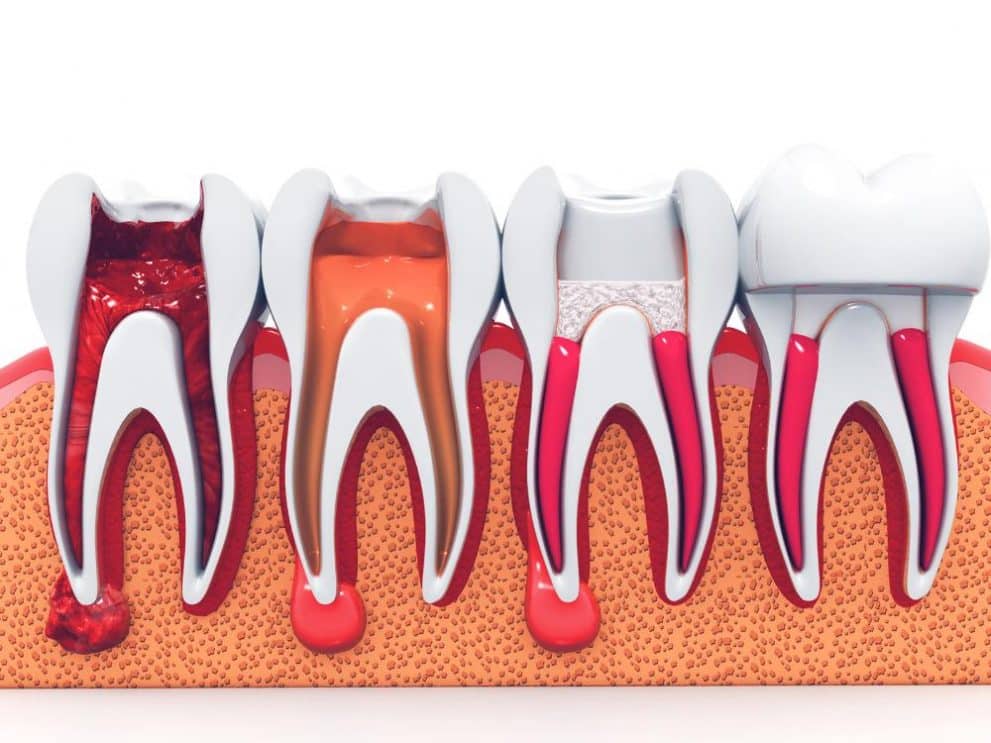You’ve just heard the words that might initially send a little shiver down your spine: “You need a root canal.” While that might sound daunting, there’s no need to fear! At Chisholm Trail Dental, we’re here to tell you that root canals are routine, straightforward procedures.
The days of root canals being synonymous with pain and discomfort are long gone, thanks to improved techniques and modern dental technology. Dr. Ryan Knight and Dr. Cindy Knight are your trusted Benbrook dentists who can turn your root canal experience into a positive one filled with expert care, compassion, and state-of-the-art technology.
 A root canal is a dental procedure aimed at treating infection or inflammation in the pulp of a tooth. The pulp is the soft, innermost layer of the tooth that houses nerves and blood vessels. When this area becomes infected due to reasons like tooth decay, cracks, or trauma, it can cause severe pain and discomfort. The root canal procedure involves removing the infected or inflamed pulp, cleaning and disinfecting the tooth’s interior, and then filling and sealing the space to prevent future infection.
A root canal is a dental procedure aimed at treating infection or inflammation in the pulp of a tooth. The pulp is the soft, innermost layer of the tooth that houses nerves and blood vessels. When this area becomes infected due to reasons like tooth decay, cracks, or trauma, it can cause severe pain and discomfort. The root canal procedure involves removing the infected or inflamed pulp, cleaning and disinfecting the tooth’s interior, and then filling and sealing the space to prevent future infection.
Contrary to popular myth, modern root canals are typically painless and highly effective, offering both immediate and long-term relief, especially under the care of skilled dentists like Dr. Ryan and Dr. Cindy Knight. They not only alleviate pain but also preserve the integrity of your natural tooth, allowing you to chew, bite, and smile with confidence.
If you are experiencing any of the following symptoms, you may need a root canal in Benbrook:
If you’re experiencing any of these symptoms, don’t hesitate. Contact Chisholm Trail Dental, your Benbrook dentist, for an immediate consultation.
Here’s a brief walkthrough of what you can expect during a root canal at Chisholm Trail Dental:
 Tooth Isolation: A small sheet called a dental dam will be placed around the tooth to keep it clean and dry.
Tooth Isolation: A small sheet called a dental dam will be placed around the tooth to keep it clean and dry.After your root canal procedure at Chisholm Trail Dental, you’re on the path to a healthier, pain-free smile. However, it’s essential to follow a few key aftercare steps to ensure optimal healing and to prolong the life of your treated tooth.
It’s common to experience some sensitivity and discomfort for a few days following the procedure. Over-the-counter anti-inflammatory medications like ibuprofen can be effective in managing these symptoms. If the pain persists for more than a few days, contact your Benbrook dentist immediately.
Good oral hygiene practices should continue even after your root canal. Gently brush the treated area with a soft-bristled toothbrush and continue flossing as usual, avoiding excessive pressure around the treated tooth. Rinse with an antiseptic mouthwash as recommended by your dentist.
For the first 24-48 hours following the procedure, stick to soft foods to avoid putting any undue pressure on your treated tooth. Stay away from extremely hot or cold foods that could trigger sensitivity. Gradually reintroduce harder foods as comfort allows.
Typically, a temporary filling or crown is placed on the treated tooth. It’s crucial to schedule a follow-up appointment to get your permanent crown fitted. This not only enhances the tooth’s appearance but also adds strength and durability.
While complications are rare, it’s important to be aware of signs that might indicate an issue. Contact your dentist if you experience severe pain, swelling, or if you notice an uneven bite. Prompt attention can help prevent further complications.
A: While extraction is an option, saving your natural tooth is generally the best choice. A root canal allows you to keep your tooth, which benefits your oral health in the long run.
A: Contrary to popular belief, root canals relieve pain rather than causing it. With modern anesthesia options, you’ll feel more like you’re having a routine filling than a root canal.
A: Most patients return to their normal activities the very next day. You might experience some sensitivity, but this typically subsides within a few days.
A: This is a myth. Root canals are a safe and effective way to treat dental infections and improve your overall health.
A: The length of the procedure can vary depending on the complexity of the tooth and the extent of the infection, but generally, a root canal can take between 60 to 90 minutes. In some cases, multiple visits may be required for optimal results.
A: A root canal is often caused by an infection or inflammation in the tooth pulp, which can occur due to a variety of reasons, including deep cavities, cracks or chips in the tooth, or trauma. Sometimes, the cause could also be a severe gum infection that has reached the tooth pulp.
A: Yes, you should be able to drive yourself home after a root canal procedure as long as you haven’t been given any sedative medication. If you have been sedated for the procedure, you will need someone else to drive you home.
A: With proper care, a tooth that has undergone a root canal can last a lifetime. It’s crucial to maintain good oral hygiene and attend regular dental check-ups to ensure the treated tooth remains healthy.
A: While it’s rare, a root canal-treated tooth can get re-infected if not properly cared for, or if the initial treatment didn’t fully remove the infection. If you experience pain or discomfort in a tooth that has previously had a root canal, consult your dentist immediately.
A: Root canals are typically performed by general dentists or specialists known as endodontists. At Chisholm Trail Dental, Dr. Ryan Knight and Dr. Cindy Knight have years of experience in performing root canals and are well-equipped to handle various complexities.
A: Absolutely, root canals are a safe and effective way to treat dental infections and save your natural tooth. They not only relieve pain but can also improve your overall oral health when done correctly and followed by proper aftercare.
Whether you need a root canal or any other dental procedure, look no further than Chisholm Trail Dental. Dr. Ryan Knight and Dr. Cindy Knight, your Benbrook dentists, are here to provide top-notch care that meets your individual needs. Contact us today to schedule your appointment and take the first step towards a pain-free, radiant smile!